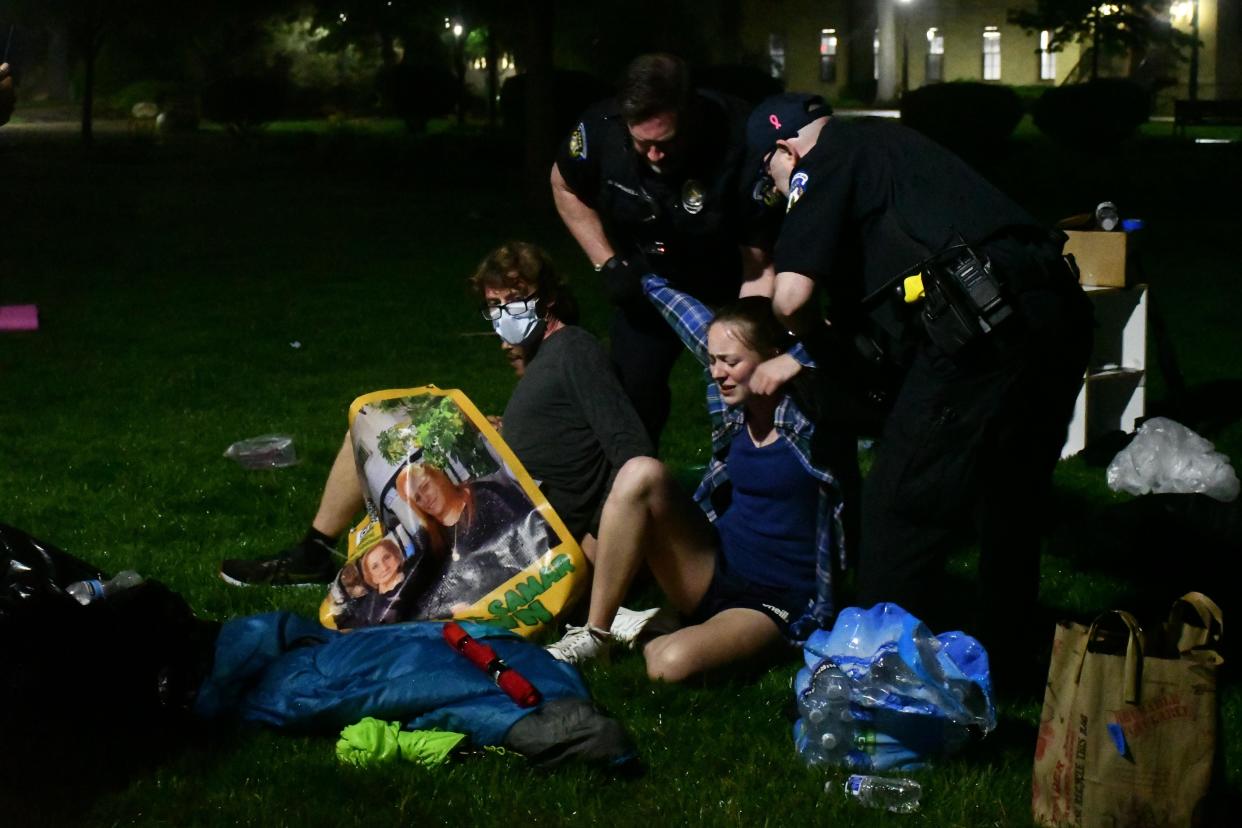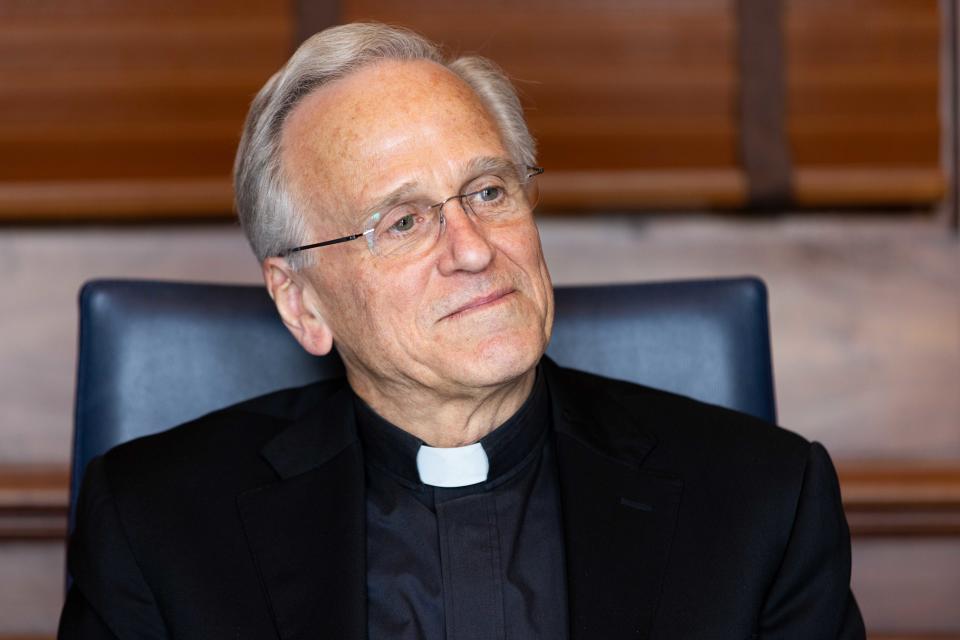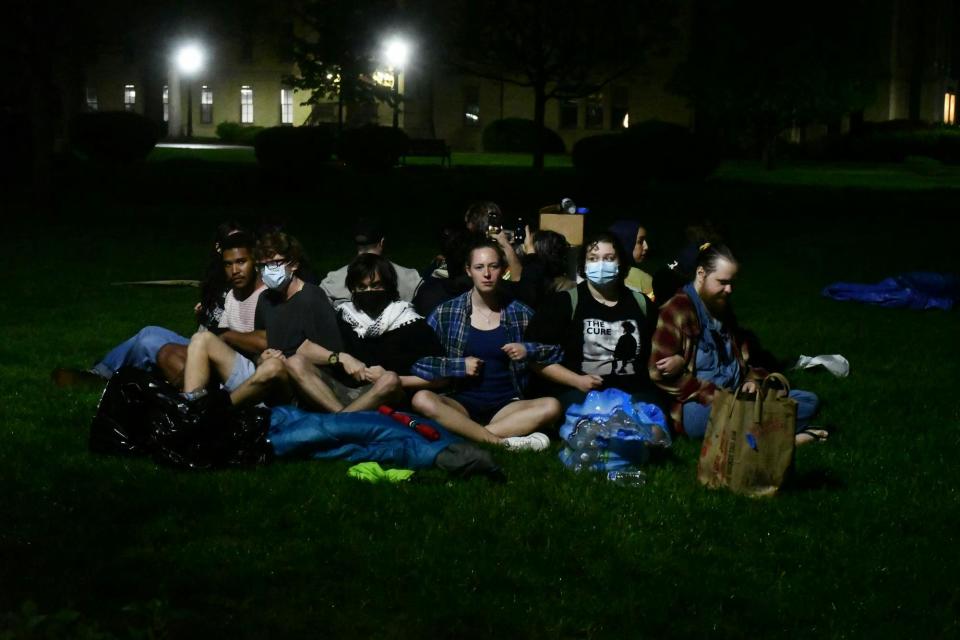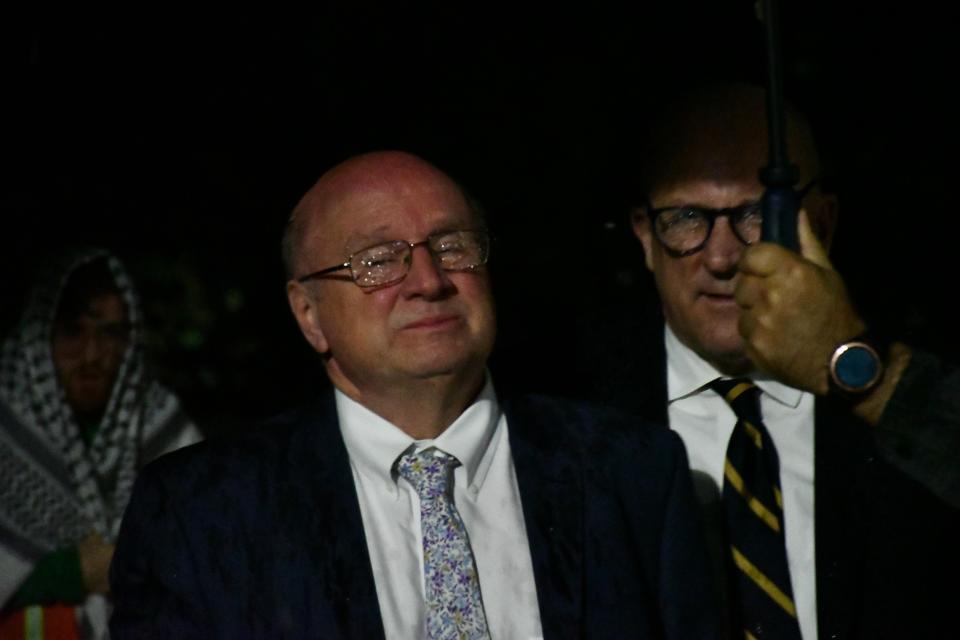Notre Dame president Jenkins commends police for 17 arrests to end pro-Palestinian protest

SOUTH BEND — Facing backlash from faculty and students, the Rev. John Jenkins said he commends Notre Dame police for the arrest of 17 people on May 2 to end a pro-Palestinian protest on campus.
In a public statement Monday, the university's outgoing president defended Notre Dame's response to a protest that lasted more than six hours, moving toward a main campus quad before arrests began shortly after 10 p.m. In all, police took 17 participants to jail that night, and each faces a misdemeanor charge of criminal trespassing for refusing to leave private property.

"While some letters we received complained of a 'disproportionate response' by University police and administrators," Jenkins wrote, "I believe the response was measured and appropriate to an unregistered protest gathering about the Middle East war, at a time when such protests have led to violence at several campuses across the nation.
"Notre Dame police and administrators carried out their duties with patience, discretion and professionalism, and I commend them for their work.”
More than 300 faculty signed their names to a letter sent to Jenkins last week in which they condemned the "criminalizing responses" to students engaging in peaceful protest. They urged the Jenkins administration to request that the St. Joseph County Prosecutor's office drop all charges against the students.
"The students shouldn’t be treated like the enemy," Atalia Omer, a Jewish-Israeli professor of religion and peace studies at Notre Dame who co-authored the letter, told The Tribune on Tuesday. "They should be talked to and engaged respectfully. It seems like the administration is so scared of the students that it's calling the police on them instead of talking to them respectfully."
“For Jenkins' response to compliment the police is very disturbing," Omer added.

Occupation Free Notre Dame, the student group that organized the May 2 protest, denounced Jenkins' statement as an "intentional misrepresentation" of what happened and called on him to drop the criminal charges and end the university's investigation into the students' conduct.
"We are asking them to come to the table and talk with us and work toward our shared commitments with Catholic values," said Francesca Freeman, a Jewish doctoral student who was part of the protest but was not arrested. "And the only response we've got is Father Jenkins' statement where he defended violence from the Notre Dame Police Department.”
About 40-50 protesters met on May 2 in solidarity with students at dozens of colleges who are urging administrators to publicly disclose their investments in military contractors and divest from support for Israel in the Israel-Hamas War. Responding to an Oct. 7 attack by the militant group Hamas that killed about 1,200 people in Israel, the Israeli military has killed more than 35,000 Palestinians in Gaza, according to Gaza's Ministry of Health.
Occupation Free Notre Dame, which held an initial six-hour protest without incident on April 25, made three demands to the university: to disclose its investments in any companies manufacturing and supplying weapons to Israel; to end Notre Dame's 15-minute rule, which generally governs the length of campus protests and requires university administration to grant approvals; and to join an international boycott of Israeli academic institutions "whose research underpins the tools that enable the ethnic cleansing of Palestinians," according to the student group.
Jenkins said the protest wasn't registered with the university as required. Two administrators, Provost John McGreevy and Dean of the Keough School of Global Affairs Scott Appleby, showed up in an effort to avoid arrests, and students who stayed after 10 p.m. "chose to be arrested," Jenkins said.
Members of Occupation Free Notre Dame told The Tribune that while some students stayed put knowing they would be arrested, others were arrested for standing by and filming the encounter.
The group said participants gathered quietly on May 2 until arrests began. They were considered disruptive by Notre Dame police simply for "standing and talking in the rain." Notre Dame police pinned some students to the ground to handcuff them and carried away others on tarps, the group says.
Later in the evening, Freeman said, the group moved from a lawn near the Eck Visitors Center, on the south side of campus, toward the Main Building out of frustration with university administrators for failing to engage with students. Several participants said they were upset after police confiscated a canopy students had set up to shield them from the rain. The shift prompted warnings from administrators because they worried the protest would disrupt students studying for final exams.
Group members said the two top administrators were dismissive during the late-night conversation with protest organizers, which they claimed lasted only 15 minutes. When protesters offered to disperse if university administration would agree to a formal meeting, the group alleges, the administrators refused.

Linnea Barron, a Notre Dame sophomore who said she left shortly before arrests started, said she was "deeply disappointed" with Jenkins' statement supporting campus police. She sees hypocrisy in a line toward the end in which Jenkins calls for "respectful, open and reasoned exchanges."
"That was exactly what we were looking for from this protest," Barron said, "but not what the university was responding with. Instead, they responded with police arrests."
Also in his statement, Jenkins applauded students whose passion compelled them to protest the devastation in Gaza. In a separate statement Feb. 9, Jenkins had already called for "an immediate, permanent ceasefire combined with the release of all hostages on both sides" of the Israel-Hamas War.
On Monday, Jenkins expressed his confidence in the county prosecutor's office and the university's Office of Community Standards, which oversees reviews of student conduct, to be judicious in disciplining students. In Indiana, criminal trespassing is a Class A misdemeanor punishable by up to one year in prison. The students are set for hearings in September.
"Whatever the motivation for their decisions," Jenkins wrote of protesters, "I believe it is important that those arrested go through these processes, reflect on their decisions and consider the consequences of them."
“I add, in conclusion," Jenkins wrote, "that I hope the current challenging moment stimulates more vigorous study, thought and discussion of the complex moral, social, geopolitical and human realities of the Middle East war.
"A university’s primary priority should be the contest of ideas, not of disruptive protests; it should be about informed, rational conversations, not chants."
Email South Bend Tribune city reporter Jordan Smith at JTsmith@gannett.com. Follow him on X: @jordantsmith09
This article originally appeared on South Bend Tribune: Jenkins commends Notre Dame police for arrest of 17 student protesters

